Living a zero waste travel lifestyle doesn’t happen in the blink of an eye; it takes time. With only a small amount of effort and upfront cost for the items in your zero waste travel kit, you can begin the transition.
The change requires a mindset shift. Start simple and build.
And remember, every little bit counts.
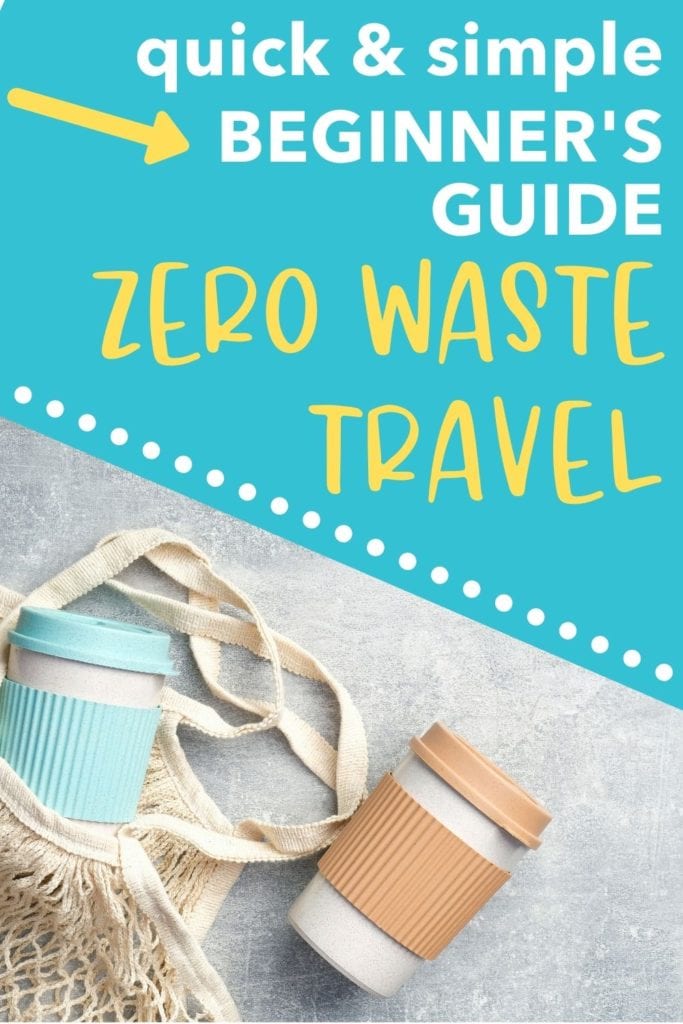
Affiliate Disclosure: There are affiliate links throughout this post. This means if you click on a link and purchase a product through that link, then I will receive a small commission for the referral. And that is kinda cool.
Can you imagine if we all did just a little better? If we all did our small part in making this great big world a better place.
Let’s get started; it is easy. And I made a zero waste kit checklist specifically for beginners to help you prepare for your next adventure
But first, get realistic. When I say “zero waste,” it doesn’t mean that you have to have absolutely zero waste. For the majority of families, that is impossible. But you can reduce your waste as much as possible.
And never forget, every little bit counts.

Three simple beginner steps on your journey to zero waste travel.
#1 Reduce single-use items and replace them with reusable products.
If this is all we did to reduce plastic waste, imagine the impact. And there are so many replacement options. It is effortless.
- Plastic water bottles.
- Straws.
- Shopping bags and produce bags. Use this instead.
- Paper or styrofoam cups.
- Coffee cups from Starbucks.
- Replace your drip coffee maker and Keurig with this so there is no paper filter or K-cup to waste.
- Plastic wear and paper napkins.
- Replace plastic bags for storage.
- Use these straws instead of plastic.
- And plastic Tupperware for storage, replace with glass or stainless-steel.
#2 Donate or sell your stuff.
Gather up items you no longer use and donate them to Goodwill, your local church or community center—this prevents these items from filling up the landfills. It will help your local community, and donations often provide tax benefits.
Or hold a garage sale and make some extra cash to save in your travel fund.
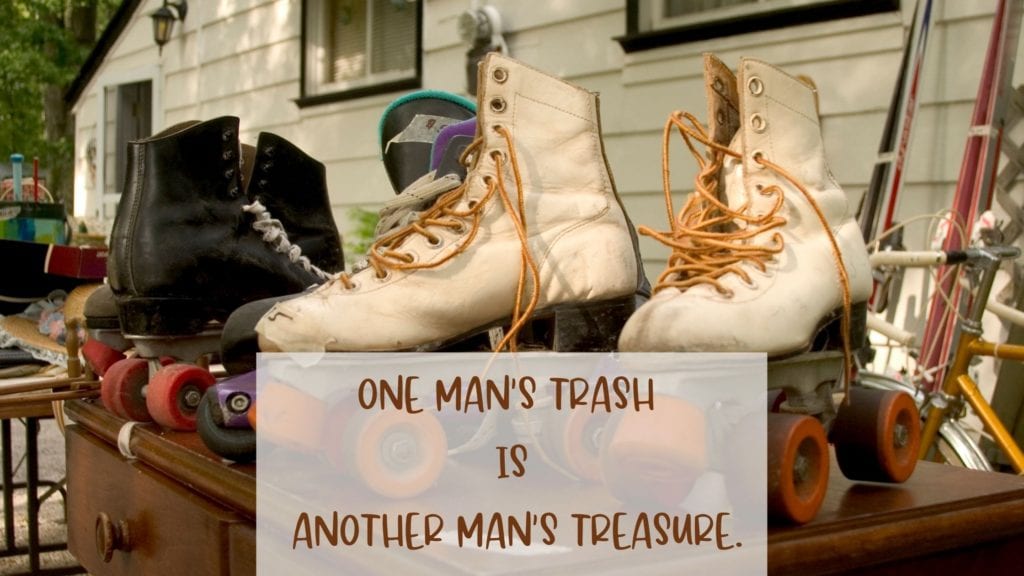
#3 Stop wasting food.
Don’t go to the grocery store hungry and buy a bunch of stuff you don’t need. Commit to only buying what is on your shopping list. Prepare what your family can eat and re-use what you don’t eat, or compost.
Cook at home as much as you can. If you are dining out, avoid take-out. Fast food is not always a healthy option, plus there are all sorts of boxes, wraps, plastic wear, condiment packets to waste. You can accomplish this on the road by visiting local markets, purchasing, and eating local.
15 essential zero waste travel tips for beginners.
1) It all starts at home.
Start at home with the basics. Continue growing from there. Then, the transition to zero waste efforts while on the road is easy.
2) Involve the entire family.
Get the hubby and kiddos in on the action. Ask them to join in your commitment to make changes to a zero waste lifestyle.
3) Do your research before you travel.
Prepare and do your research before you head out on your adventure. Research your destination. Find local markets, restaurants, and breweries. Find lodging that is making efforts towards becoming environmentally responsible.
Use this zero waste travel kit checklist when you are packing for your vacation.
4) Walk as much as you can.
When exploring your destination, walk as much as you can, or rent a bike. Walking allows you to immerse yourself in the culture and daily life; you see, hear, smell, and feel more when you walk. And when you can’t walk or ride your bike, check out the local transportation.

5) Consider staying at an Airbnb rather than a hotel.
You will have the benefit of paperless and contactless check-in and check out. You can shop at the market and will have plenty of space to store your groceries, and you can prepare all of your meals. And you have privacy and peace.
This Airbnb in Blue Ridge, Georgia, is heavenly, and you can bring your pup with you.
6) Organize you packing essentials.
Gather your zero waste travel products for packing—this list of basics will help.
7) Plan to eat and buy local.
Eat at the local restaurants, shop at the farmer’s markets, find local artisans to purchase souvenirs, drink the local brewed beer and wine, and drink coffee from places where they roast their beans.
It’s all part of the travel experience of immersing yourself into a different culture.
Avoid fast food joints, they aren’t part of the cultural experience, they usually aren’t healthy, and they come with wasteful packaging.
8) Go paperless.
Paperless tickets for flights and events and paperless check-in. And for the bookworms, this is a tough one, and I am struggling. But, use Audible or Kindle Paperwhite. If you have to hold on to a book (I do), pick up one at the library.
9) Never litter.
Always throw away your trash and NEVER litter. Don’t be that guy.
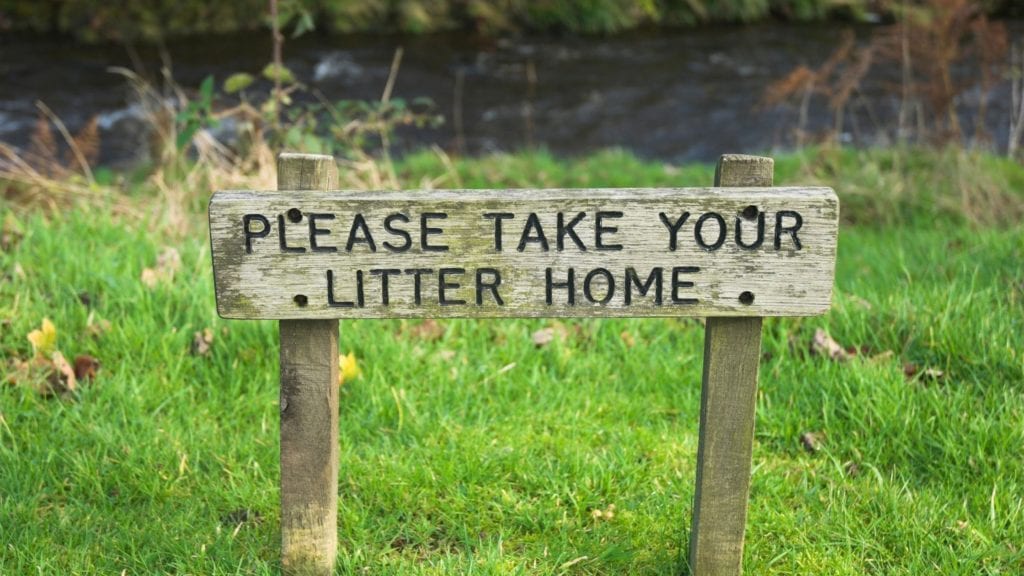
10) Avoid the souvenir trap.
Another tough one for me. Try to resist a bunch of cheap and cheesy souvenirs that will end up in that top junk drawer, like pens, keyrings, magnets (ok maybe magnets are fun for the fridge).
Instead, shop for locally handmade goods. Buy a locally handcrafted ornament for the Christmas tree, so when you decorate each year, you can reminisce about your fantastic vacation. And mugs that you can re-use over and over. Leave the cheesy touristy junk in the stores.
11) Pack plenty of healthy snacks in disposable containers.
Avoiding hanger will decrease your risk of scarfing on fast foods.
12) Always carry a reusable bag.
And maybe even these reusable mesh produce bags.
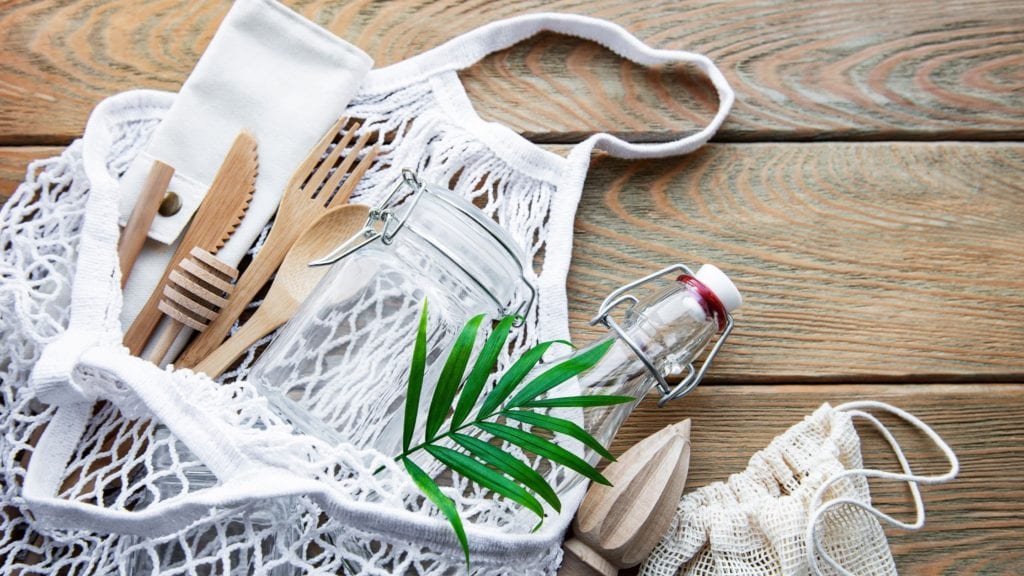
13) Purchase experiences, not stuff.
While traveling (and at home), spend your money on experiences. Create memories of a lifetime on the rapids in North Georgia, on an ATV over the red rocks, a food tour, or a sunset cruise. The time spent with your family experiencing the incredible world we live in is what it’s all about.
14) Do not disturb.
Use the Do Not Disturb sign in the hotel room. You don’t need your room cleaned and new towels every day.
15) Conserve everywhere you can.
AND you don’t need your room at 60 degrees in the summer or 80 in the winter. Conserve every chance you get.
Zero waste travel kit checklist (and a PDF).
Toiletry essentials for travel to include in your zero waste travel kit.
**Tip: Use up what you have first and then replace items gradually with zero waste products.**
- Replace your plastic toothbrush with this bamboo beauty; it’s the new craze. When finished, you can throw it in the compost.
- They make this toothpaste that is a powder and zero waste. Tried it, not a fan. But you may like it. And it eliminates those plastic tubes of toothpaste.
- Replace your plastic brush with a bamboo brush.
- Reusable cotton swabs to use as a makeup remover.
- Ditch the plastics. Use reusable glass travel cosmetic jars instead.
- Use bar soap instead of using body wash in plastic bottles.
- Did you know shampoo and conditioner come in bars, too?
- And transport your bars in a stainless soapbox.
**Many items I have purchased and shared here are from Amazon. Amazon’s packaging is recyclable. If you need to know how to recycle a particular packing material, read this.**
Food and drink essentials to add to your zero waste travel kit.
- Nondisposable water bottle.
- Reusable coffee cup.
- Canvas bags.
- Small mesh bags for produce.
- Reusable utensil set with linen napkins.
- Reusable straw.
- Stainless steel containers for snacks and leftovers.
- Or purchase this Zero Waste Bamboo Kit from Earth Aloha that includes twenty pieces—a silverware set, straw, stainless containers, produce bags, carrying bags, a travel-friendly water bottle, and a linen napkin. The mission of Earth Aloha is to create and sell products that are meaningful and make a difference.
Download your Zero Waste Travel Kit Checklist Here.
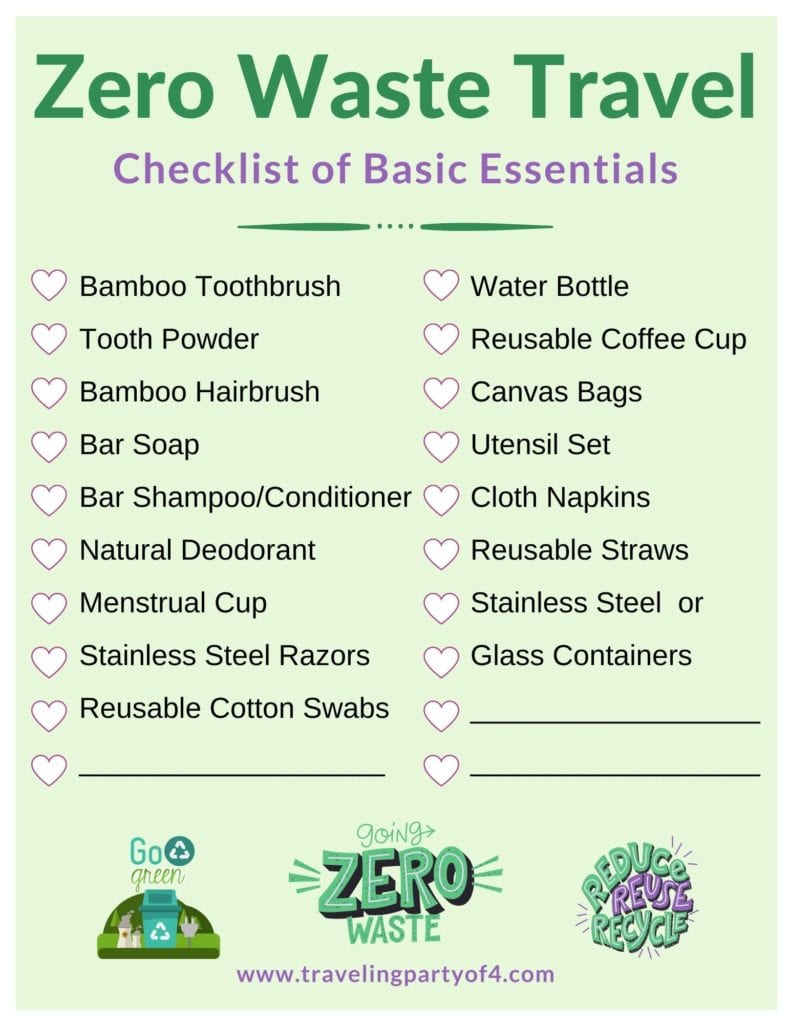
Here are a few more things to consider when you advance in your zero waste travel journey.
I am not quite there yet. But I am working on it.

If you start with baby steps and build upon a strong zero waste lifestyle foundation, you will make a big difference in the world.
Have you tried any of these zero waste travel products? What do you think?
What would you add to the list?
And what tips and tricks helped you the most in your venture to become a zero waste traveler?





great tips! some of them I do especially bringing my own tumbler when Im traveling saves me money from buying drinks. Also love to walk and explore its good and I see more views plus take photos. thanks for the tips. I would like to practice more being sustainable.
Me, too. I am taking it one step at a time. I love it.
These are great tips! I love finding ways to be less wasteful, and this helps! Thanks 🙂
These were great tips. I am getting ready to travel for the holidays. I love the checklist
I am all about the checklists.
I’ve found these tips very useful for travelling, as well as everyday-life. I especially love the checklist you’ve created 🙂
I agree we should use these tips every day, then when we travel, it’s second nature.
It should be so easy, and all your points should be obvious to us all! In reality, we live in a world where I left a hospital this morning, and the first thing I saw as I stepped out was a used face mask thrown in a dirty heap on the ground; somebody discarded it, and somebody else had already stepped on it as if it weren’t even there!
We take this planet for granted and destroy it at a hallucinating speed. What we prefer to ignore is that this will soon turn against us all. It really bugs me. If you only could make your post into advertising panels and cover all the useless commercials and political crap with them! THIS is what really matters, not how to spend your money on useless things and your time on useless politicians’ blabbering!